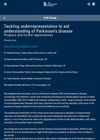 January 2010 in “Springer eBooks”
January 2010 in “Springer eBooks” Hirsutism can lower a woman's quality of life, causing emotional distress and affecting social and work opportunities.
 January 1983 in “Journal of the American Oil Chemists' Society”
January 1983 in “Journal of the American Oil Chemists' Society” The U.S. soybean industry wanted government help due to foreign competition, while the jojoba industry was growing and expected to stabilize.
 April 2024 in “Skin research and technology”
April 2024 in “Skin research and technology” Minoxidil with triamcinolone acetonide is more effective for mild alopecia areata when injected with microneedles than when applied topically.
1 citations,
November 2023 in “Polymers” Polyurethane dressings show promise for wound healing but need improvements to adapt better to the healing process.
 December 2023 in “Journal of dermatology”
December 2023 in “Journal of dermatology” Adults and adolescents with severe alopecia areata are willing to take significant health risks for a better chance of hair regrowth.
32 citations,
July 2017 in “Molecular diagnosis & therapy” MicroRNA-21 could help diagnose and treat skin fibrosis.
15 citations,
May 2021 in “International Journal of Dermatology” Climate change can cause migration, spreading and increasing skin diseases.
9 citations,
December 2021 in “Androgens” Androgens like testosterone may help treat traumatic brain injury by reducing mitochondrial stress and inflammation.
 6 citations,
June 2022 in “Frontiers in Psychiatry”
6 citations,
June 2022 in “Frontiers in Psychiatry” Many patients with various medical conditions experience anxiety, which worsens their quality of life and raises healthcare costs.
 3 citations,
September 2023 in “Advanced science”
3 citations,
September 2023 in “Advanced science” A new vaccine using a porous scaffold boosts immunity and protects against the flu better than traditional methods.
 2 citations,
November 2022 in “BioMed Research International”
2 citations,
November 2022 in “BioMed Research International” Baicalin may help treat hair loss by promoting hair follicle growth and activating specific cellular pathways.
2 citations,
May 2018 in “PubMed” Pregnant women with isolated hypothyroxinemia face more health issues, so iodine and folic acid supplements are important before and during early pregnancy.
 2 citations,
June 2023 in “Pharmaceutics”
2 citations,
June 2023 in “Pharmaceutics” Nanofiber scaffolds help wounds heal by delivering drugs directly to the injury site.
1 citations,
December 2023 in “International journal of molecular sciences” miR-199a-3p controls hair growth and is linked to alopecia areata.
February 2024 in “Neurophotonics” Light therapy on the brain shows promise for treating brain diseases and improving brain function.
November 2023 in “Bioengineering” AMT® is effective and safe for early-stage knee osteoarthritis.
May 2023 in “Clinical and translational neuroscience” Tailored neurorehabilitation programs improve life quality for post-COVID-19 patients.
 December 2022 in “BMC women's health”
December 2022 in “BMC women's health” The CNC® prosthetic system improved body image in breast cancer patients with hair loss from chemotherapy but did not significantly change their psychological wellbeing.
 September 2021 in “Physiology News”
September 2021 in “Physiology News” Increasing research diversity is key for better understanding and treating Parkinson's Disease.
146 citations,
September 2013 in “Advances in nutrition” Bariatric surgery can cause serious mineral deficiencies, requiring better patient education and monitoring.
14 citations,
January 2020 in “Women's health reports” Iron deficiency in menstruating women causes many health issues beyond anemia and needs early detection and treatment.
 8 citations,
July 2021 in “Patient Preference and Adherence”
8 citations,
July 2021 in “Patient Preference and Adherence” Alopecia treatments improve life quality but side effects can lessen this benefit; better use of quality of life measures is needed.
 7 citations,
July 2019 in “International archives of internal medicine”
7 citations,
July 2019 in “International archives of internal medicine” Common skin conditions can greatly affect a person's mental health and social life.
 4 citations,
January 2022 in “Life”
4 citations,
January 2022 in “Life” Tissue engineering could be a future solution for hair loss, but it's currently expensive, complex, and hard to apply in real-world treatments.
2 citations,
February 2024 in “International journal of molecular sciences” Gut health affects skin diseases, and probiotics might help.
 1 citations,
August 2023 in “Military Medical Research”
1 citations,
August 2023 in “Military Medical Research” Smart hydrogel dressings could improve diabetic wound healing by adjusting to wound conditions and controlling drug release.
 1 citations,
August 2023 in “Bioengineering”
1 citations,
August 2023 in “Bioengineering” PRP may help with aging and osteoarthritis, improving tissue repair and reducing surgery risk.
 January 2025 in “Heliyon”
January 2025 in “Heliyon” Tamsulosin and finasteride have similar effects on blood sugar control in men with type 2 diabetes.
 November 2024 in “Indian Journal of Rheumatology”
November 2024 in “Indian Journal of Rheumatology” Educating primary care doctors and improving referrals to rheumatologists can reduce delays in treating lupus patients.
 March 2024 in “Healthcare”
March 2024 in “Healthcare” Stem cell treatment improved life quality and sexual function in women with hair loss.


















